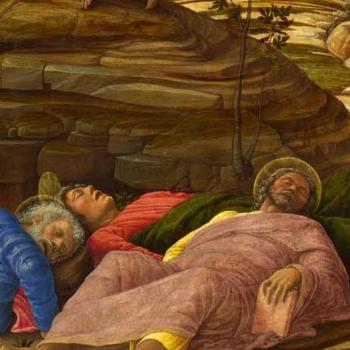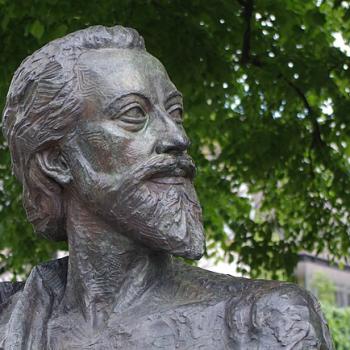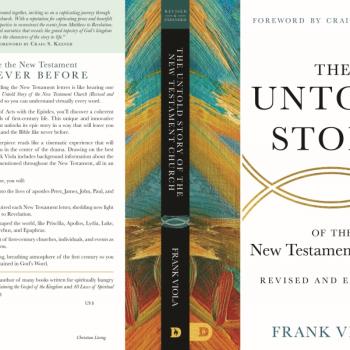Speaking of desire, you remake the venerable idea of Jesus as bridegroom. You call him "the boyfriend." What's that about?
Jesus as the boyfriend. It's funny and queer, but really the reason I like "boyfriend" as opposed to "bridegroom" is that it shows how utterly outside the law Jesus' relationships with us are. It is not about the law. It's the boyfriend, not the bridegroom. He's not establishing himself as the bridegroom in a traditional family in which everyone has a defined role. And where you as the subject/child/bride fall into line. It's outside of this line.
There are so many problems with church as it is. Do you think the institution is redeemable?
Well, I don't think the answer is: let's have a church with groovy music that the kids like. That's just endless marketing.
Here's what I saw, going around the country. People want to do stuff, and they actually want to do Jesus' work -- they want to be disciples. And instead they feel like they're shunted into these slightly embarrassing, not exactly shabby, but not-working-very-well institutions. The attempts to modernize and make it creative don't necessarily deal with the basic problem: at some point the church becomes about maintaining the church instead of being about empowering people to do the work that God gives them to do. And it becomes a place where you prove yourself by being good, as opposed to a place where you become more and more whole.
What is it about church? I could say all kinds of bitchy things about all kinds of churches but I think it's actually a constant tension: it's not that all churches are bad and it's an inherently screwed up system. I don't think that the answer is what a lot of people say, which is, Well, I'm spiritual but I don't believe in organized religion. Or I don't want to be a part of a church because they're all about power and they're corrupt. I think there's a huge function for a church, which is to be a body.
Right? To be a body that actually you didn't pick. It's incredibly important for people, and I think the challenge about church is not how to make it more relevant, how to make it more hip, cooler, or how to dispense with it entirely in this sort of über-Protestantizing impulse -- "It's just going to be me and Jesus and we're going to have a great thing going, without anybody else." I think the challenge is how to see yourself as part of a body, and to keep that body constantly permeable, so people are coming in and going out. It's not: This is our wonderful home, our beautiful club, our church. But rather, who are we and what are we doing as a body.
Church is actually a place for people to experience we. You can experience we in that fascist assembly way in which we're all standing and reciting prayers in unison and blaming the Jews for everything that went wrong. But there are other ways of experiencing we that actually come from looking at the traditions, participating in them. And fighting against the individual consumer model of everything -- actually submitting to being part of a body, and focusing your life together on work. Real work, as opposed to simply replicating church.
I like that idea of it being people you don't pick yourself. That strikes me as one of the best things a community can offer.
I just think that's the greatest thing. I need to be knocked around in the great rock tumbler of the church with people I didn't choose -- because left to my own devices I'm gonna choose people like me. And that is not how Christianity works. Christianity puts you together with all humanity. It's not about your choice. It's about "this person is part of the body too," and that I can't actually understand myself without understanding my relationship to you.
Again, it's a religion of relationship. And you don't get to pick what the edges of that are.
There's that great part in Acts where this trippy sheet comes out of the sky and it's filled with crawling things and snakes and pigs and insects and spiders and God says to Peter, You should eat. And he says, I can't eat this, it's all unclean. And God says, How dare you call unclean what I've made. I've made everything.
Did writing about this change your experience at all the way you operate in community?
Paul Fromberg, the priest in charge of St. Gregory's who cooks for the food pantry with me, said something so lovely once about the work of community: "We're doing midrash on our own lives." Or you could call it gospel-making. We're making gospel.
It's a religious practice, to pay attention to what you're doing, and try to look at it, ask what it means. The process of remembering, rebuilding through story, is incredibly eye-opening.




